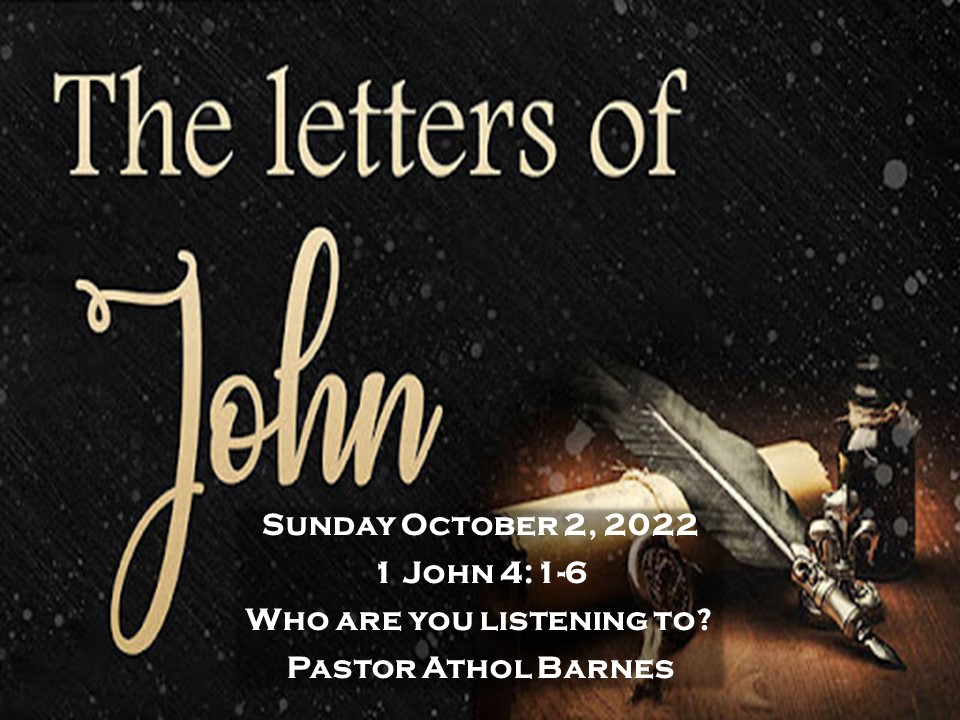
Who are you Listening to?
In the first few verses of 1 John 4, we have a warning against false prophets, who are deceiving the church. Satan is the master liar and manipulator.
John says in verse 1, “many false prophets have gone out into the world.”
Satan is constantly sending out evil spirits to deceive and spread a false message, influencing false teachers to teach a false Gospel.
We need to be alert, ready and praying for discernment, especially in our world of mass media where we can view thousands of hours of teaching on any subject we choose.
A prophet is a person who declares the truth of God and seldom is it in the context of foretelling the future.
The Bible warns us that not everyone who claims to be speaking for God is actually a prophet of God (Matthew 7:15 and Matthew 24:11). With the advent of the internet, we have seen a rise in false prophets.
In this passage, six times John uses the term “from God”, and six times he uses the term, “the World”. We must not be so naïve as to think that those who are from the world, are not in the church. Satan’s greatest attack against the church has always been from inside the church.
John gives us four tests we can use to avoid being led astray.
1: Am I being deceived? (1 John 4:1).
The problem is that we are theologically lazy. The vast majority of the church is Biblically illiterate or weak at best. How can we know if someone is speaking God’s truth or not if we don’t know the Word of God. Satan and his demons know the Bible and how to twist the word and make it sound true when it is not. Satan is still casting doubt in people’s minds as he did in Genesis 3:1.
Behind every prophet there is an empowering spirit, and their message will let us know if they are from God are not. We don’t have to look further than the recent history of high-profile church leaders who had incredible ministries, but behind the scenes there was manipulation, control, and sexual sin. These sins were often excused by the incredible “fruit” from their ministry. But God is not mocked, and hundreds and thousands of people are hurt in the end.
2: Are they proclaiming the true Jesus? (1 John 4:2).
Christianity is about Jesus. What do you believe about Jesus.
Is he simply a great religious leader? Is he just one option amongst many? Or Is he God in the flesh, fully God and fully man, the only way the truth and the life.
The best way to test the spirits is to ask the Jesus question. The Holy Spirit of God will always honor Jesus Christ, the Son of God (John 16:14).
The alternative is in verse 3, “and every spirit that does not confess Jesus is not from God. This is the spirit of the antichrist, which you heard was coming and now is in the world already.”
John writes that false prophets will not confess that Jesus is the Christ. Many false teachers today, even in some mainline denominations refuse to acknowledge that Jesus is God. This is the spirit of the Antichrist. As we looked at in 1 John 2:22 on June 26, http://atholbarnes.com/2022/06/26/sermon-sunday-june-26-2022-who-is-jesus/
The spirit of Antichrist always diminishes the person and work of Jesus. Rejecting that he is fully God and fully man, rejecting the fact that his blood atones for our sins.
3: Who are you trusting? (1 John 4:4).
What an incredible promise, “for he who is in you is greater than he who is in the world.”
Are you trusting in the greater spirit?
Satan and his demons have a large following, the world seems to be powerfully opposed to the things of God. The daily attacks are sometimes overwhelming. But all of Satan’s plans are divinely destined to fail (Matthew 16:18).
Notice the tense of verse 4, “you are of God, and have overcome them…”
We have the misconception that spiritual warfare is about swinging the sword of the spirit and slaying demons. However, the victory has already been won. Spiritual Warfare is about standing firm and declaring the promises of God’s word, as Watchman Nee writes in his book, “Sit, Walk, Stand”.
As we commit our lives to the Lordship of Jesus Christ, his victory becomes our victory and God’s Spirit lives in us. The Holy Spirit is the one who glorifies Christ through our lives as we stand firm on the promises of God.
As believers we need to be reminded of this, we hide and don’t speak up in the public square. We pray for Jesus to come again so that we can put all this messy world behind us. But Jesus calls us to live victoriously with a supernatural assurance that the victory is already won. Are we living daily from that victory, boldly living for Christ?
4: Are you listening to the right teachers? (1 John 4:5-6).
False teachers are not of God, but from the world and the domain of Satan and his demons. False teachers have a secular worldview.
If you have a Biblical worldview, based on the promises and the truths of God’s word, then you will have an eternal perspective on everything, marriage, sexuality, abortion, death, war, finances, and even the pain and challenges of life (1 Corinthians 4:16-18).
A secular worldview proclaims that this is all there is, grab as much as you can, pursue pleasure, make a name for yourself, leave a legacy. A secular world view leads to hopelessness.
Who are you listening to?




